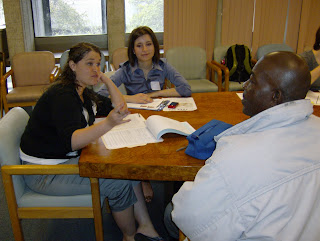
When the clock struck 6 on Friday afternoon, we had submitted to the United States Citizen and Immigration Services 19 applications for Temporary Protected Status, the overwhelming majority of which included requests for the U.S.C.I.S to waive the nearly $470 in application fees. All 19 entailed applications for employment authorization, so if the TPS is granted the applicants can legally reside and work in the United States.
For an additional 6 files that were complex and either would not be eligible for TPS or at least would not be eligible at this point, the supervising attorneys from the University of Miami encouraged us to produce memos that lay out, at least preliminarily, the legal and factual complexities of those cases, so that the U.M. Health and Elder Law Clinic can expeditiously move those files forward.
In just five days, we learned a lot about immigration law, but obviously only a fraction of what there is to learn. We also learned a great deal about the functioning of the administrative state. Those of us who had just completed Admin Law found the experience particularly valuable in providing a practical context within which we could apply and examine the concepts we had learned. The experience also demonstrated some of the limitations of the theoretical and conceptual discussions that inform the study of Administrative Law.
We also had a great clinical education experience. We spent two mornings doing case rounds with the supervising attorneys from the University of Miami. They were astute attorneys, who helped us navigate and manage through all the gray areas, and perfectionists who had us redo and redo again until the applications were perfect. They were also inspiring. Their genuine commitment to our disadvantaged clients, their passion for the work, and their energy and enthusiasm were inspiring and contagious.
And of course, we were touched by so many of the stories that we heard. One, in particular, might be worth highlighting. One applicant that came to us was actually not eligible for TPS. He came to the U.S. after the date of the Earthquake. A retired firefighter who was volunteering in the rescue effort in Haiti found a boy and his father. The boy had leukemia and would almost certainly die very soon without hospital care. With the firefighter’s help and the help of a local church, the boy was brought, by helicopter, to Miami and granted access on humanitarian grounds. His father was later allowed to enter as well. The young man is permitted to stay in the U.S. to receive medical care for about another year, but his father only has permission to stay for another two months. The father and son are not eligible for TPS as they arrived in the U.S. after the Earthquake, but our group has hopefully laid some groundwork for the U.M. clinic to secure more permanent status for him. And, given what we know of some of the students in the clinic and the attorneys, we are absolutely certain that the folks at U.M. won’t let this go until they are successful.
As for me, the trip culminated as it began, in a very personal way. We spent two days getting the word out about TPS in general and, in particular, the intake sessions that we were doing that week. Given the large concentration of Haitians in North Miami, we spent both days in the area, including at the elementary school and high school I attended, the grocery stores and shops I patronized growing up, and on streets just blocks from my old home. We decided to visit my old high school (which was also the high school at which I taught) in the late afternoon as that was the time that folks who attend evening English and GED classes would be there. This meant that most of my former teachers and colleagues weren’t around when we got there. I did however bump into one teacher who is Haitian and who had gone back to Haiti for a few years to advise the government there. He said that he would return to Haiti the first chance he gets, but this time contribute to bettering the country by starting in the countryside rather than in the capital, helping to educate the populace there. As we were departing he said, “I’m so proud. We trained you to go save the world…and now you are.”
I also met a client as she was walking between buildings at Jackson Memorial Hospital. The U.M. Health and Elder Law Clinic has a regular presence at Jackson, the County’s hospital that provides healthcare to the indigent. Fortunately, it was few and far between, but as a young person I did spend time in the waiting rooms at Jackson. My client, however, is not so lucky. Her 8 year old son has sickle cell and down-syndrome and so they are there frequently. Her case was sufficiently detailed that I ended up spending two days with her. In the last several minutes of the second day, before we wrapped up, in her broken English, she said “I pray that God saves your life.” Amen.
The day after I returned from Miami, she called me, just to check in.
Ed. note: Sean Hassan is a second-year law student at Stanford Law School.











